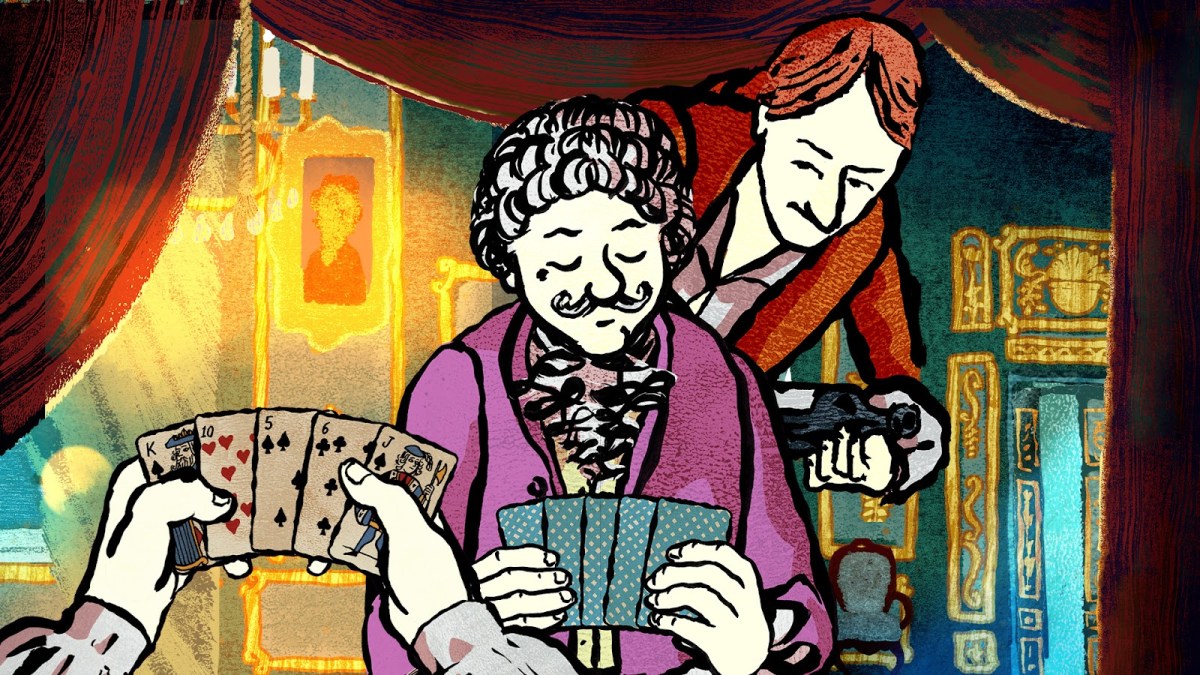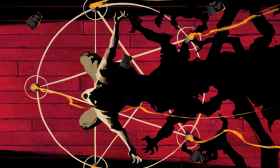Under the chandelier candlelight of the Toulouse Parliament Cafe, Jean-Baptiste le Rond d’Alembert beams knowingly through the din. Tickled pink he is, by the two men across from him – one young, one old – of no class, no stature; bending and playing with morals and virtue as easily as one can shuffle a deck of cards. It’s the cards that tipped d’Alembert off in fact; the way this game between three gentlemen has unfolded is a mathematical impossibility, and as a historically notable mathematical genius, d’Alembert knows a thing or two about impossible numbers.
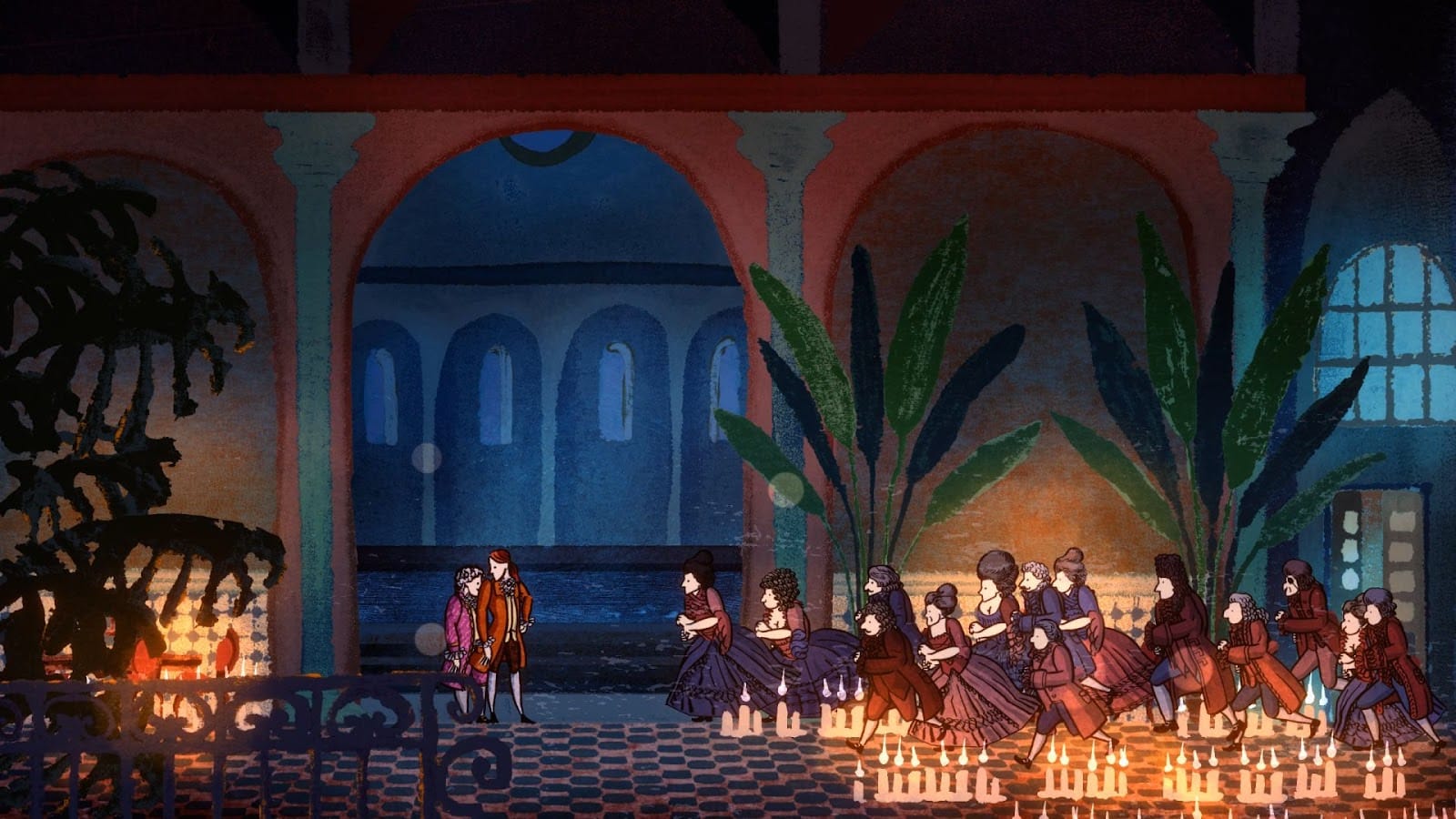
‘But…you are cheating!’ he exclaims with glee, thrilled to meet two others on the philosophical road heading out of the ethical trappings of 18th century France, a country ruled by the deluded and the disaffected; a political class so removed from reality, so easily bemused, that the idea they may be deceived or tricked by some no-name cardist doesn’t even register into their world.
As d’Alembert puts it; ‘the nobility is full of scammers and cheats, but they are mostly inept amateurs.’ In France, the truth of the matter is that, past a certain socio-political threshold, all of these people are charlatans in one sense or another, grown contented and slow on the presupposition of their power and influence. Card Shark – the new adventure and card cheating simulator from UK developer Nerial, released in June 2022 – is all about beating them at their own game.
Read: Card Shark Review – a very neat trick
The real Card Shark
‘It sort of happened a bit despite ourselves,’ Francois Alliot, writer and game designer for Card Shark says from his UK office. ‘I like to do things myself, I like to program, I like to write, I like to design.’
When startlingly impressive resumes from game development graduates started landing at Francois’ and Nerial’s doorstep; Francois, his wife (and Nerial CEO) Tamara Alliot, and long-time partner Arnaud De Bock knew the time had come for their studio to grow beyond their previous series, Reigns.
It’s entirely possible, though, that Card Shark wouldn’t exist were it not for one person: Nicolai Troshinsky – credited as the ‘card cheat’ behind the game, along with his other roles as artist and animator. During a 2019 visit to London, Troshinsky first seeded the ideas of what would become Card Shark, while Alliot and the Nerial team were in the middle of designing Reigns: The Council, a physical board-game entry in the Reigns franchise for which Troshinsky was a tester.
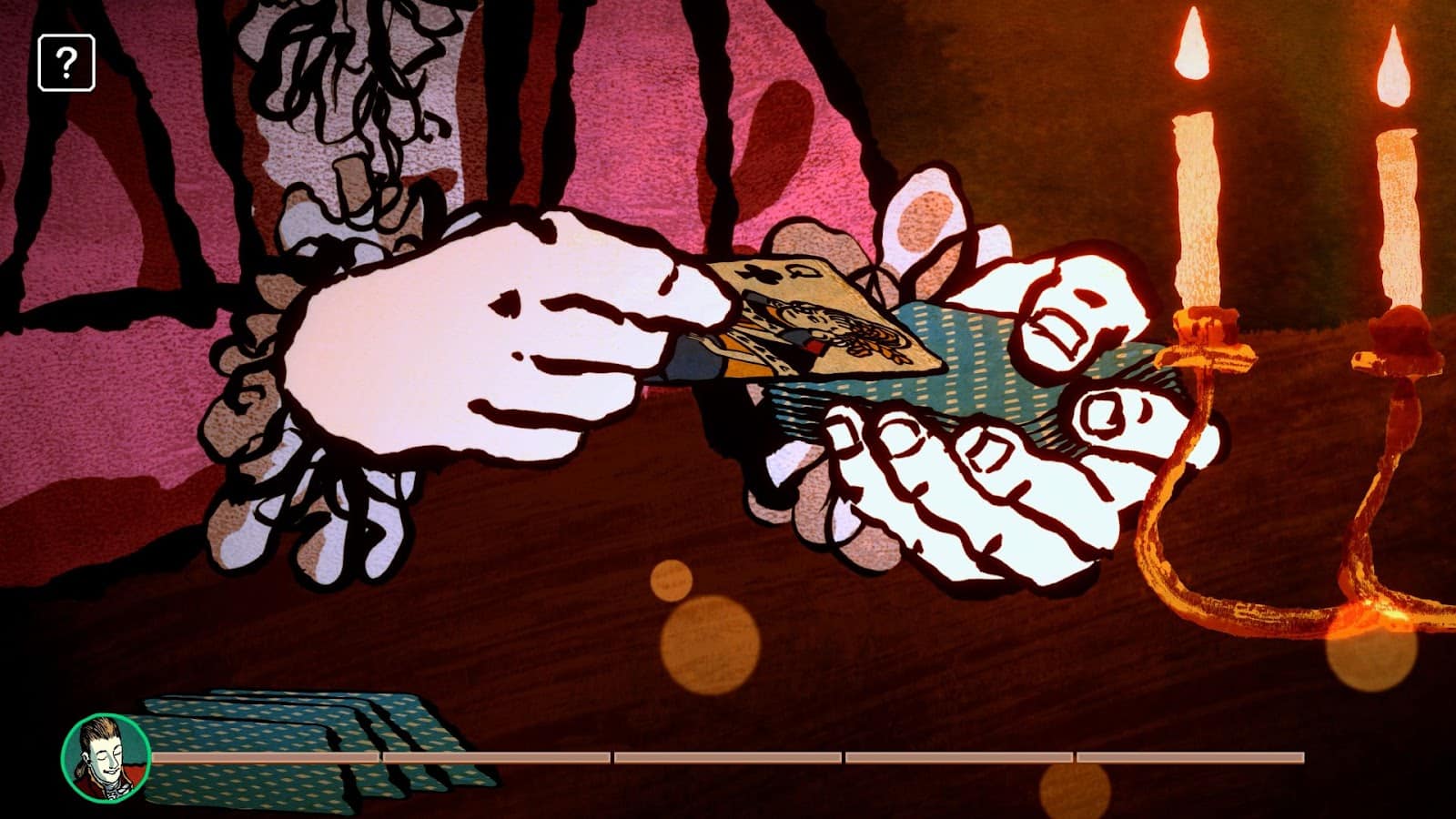
‘The first conversations about the game were between Nicolai and Arnaud,’ says Francois. ‘Nicolai is a very interesting type. He really likes to go deep into a subject, so he went deep into card tricks and magic, and started to learn a lot of things around that.’ Troshinksy’s obsession with, not just the mechanics of card tricks, but the performance of them is clear; he appears in promotional videos for the game, replete in a white wig and finery ripped straight from the grounds of Versailles.
Lighting the way
Alliot, for his part, was very interested in the French Revolution at the time, the historical setting which united with another of Troshinsky’s obsessions, Stanley Kubrick’s 1975 film Barry Lyndon.
The cinematography of Barry Lyndon, and the way Kubrick harnessed natural light (through the use of camera lenses initially intended for NASA) throughout the shooting of that film is a visual language Card Shark is positively drenched in. The candlelight of an intimate, stately dinner; the piercing early dawn light upon a prison cell. Aside from Troshinsky’s use of monoprinting to create the environments of Card Shark, the digital lighting overlaid throughout the game serves to heighten and breathe life into the game’s spaces.
But who would populate this world? ‘Basically,’ explains Alliot, ‘Nicolai was asking me: “who could be the characters, what would be the events,” this kind of thing, so I started making a list of characters that are interesting in history, but not really well covered. Like, we know about them, but we don’t really know what they did, so I started to bring them together and imagine.’
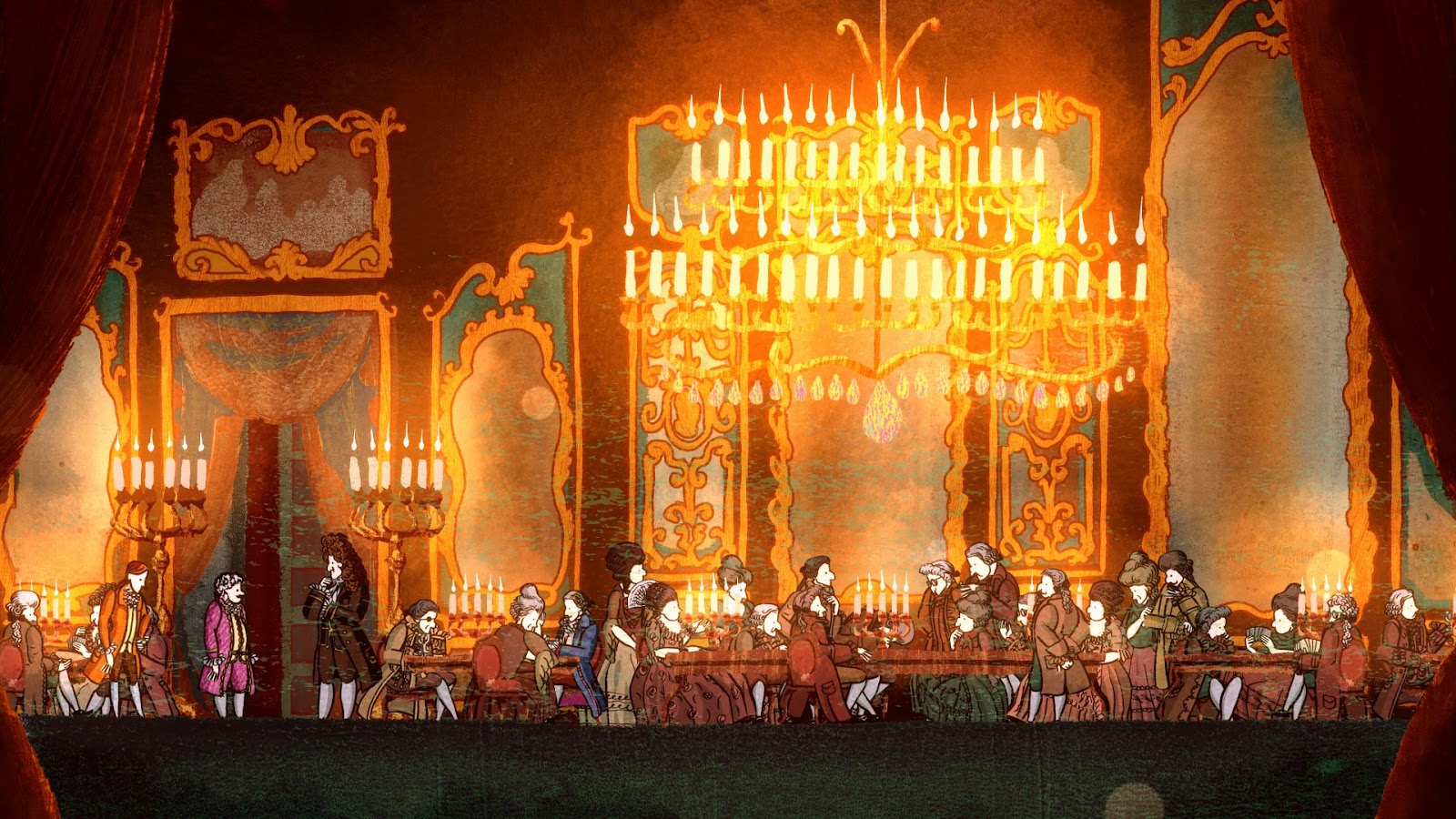
‘I’m not a classic writer, I needed to have an idea of the gameplay, so I started to match the characters to the different tricks. Some tricks are about cheating an honest man, whereas some are about cheating a cheat.’
Alliot went on to talk about a character you meet early in Card Shark, the arrogant, hot-heated Colonel Gabriel of the French Army. When the Colonel almost catches you mid-swindle – in the presence of a judge, no less – you use a card flicking technique to send a suspicious ace card or two under the seat of the Colonel, painting him as the real cheater at the table. The player character, Eugene, often uses these kinds of simple card tricks as a mirror, using them to reflect the ridiculous actions of the French upper classes back on them. His companion, the Comte de Saint Germain, always tailors the specific tricks the duo will use to match the individual they’ll be facing.
When Kubrick meets Wario
Behind the scenes of the game’s development, Troshinsky created a massive spreadsheet where he logged all the card tricks that appear in the game, and the sort of person they might be effective against; someone quick to anger, perhaps, or someone so focussed on their cards that they neglect the rest of the table. Alliot’s writing of the game’s story and characters occurred after a lot of the gameplay and tricks had been established, to the chagrin of Troshinsky at times, but the latter’s fundamental interest in cards and card trickery was enough creative juice for the early years of gameplay development.
‘We looked a lot at Warioware, and mini-games. In the end, the game is like a collection of minigames with story in between. Outside of games; Kubrick, definitely. Not just for the story, for the lighting and the art,’ says Alliot. ‘For the writing, in particular I used – not so much his style but more the method – Alexandre Dumas. Which is basically, to look at history, and just pick interesting characters and put them together and make them do things, which aren’t really things that happened in history, but it’s still interesting because they have interesting lives.’
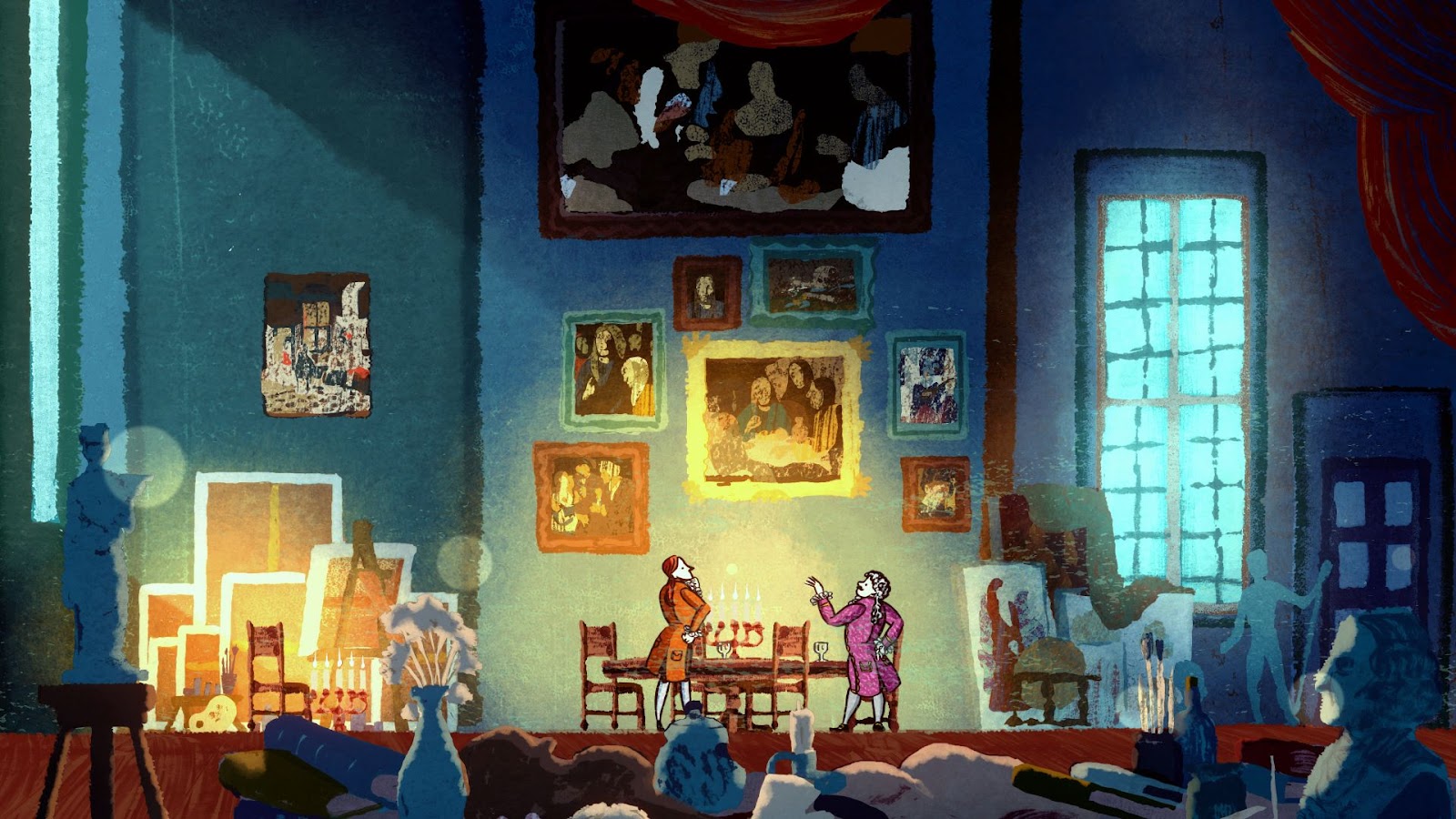
Which leads naturally to a character I’d consider to be the lynchpin of Card Shark as a whole. Based on a historical figure, Comte De Saint Germain is ever mercurial. The real man himself used upwards of eight pseudonyms, revelling in a state of charming, playful anonymity – including claims to various royal dynasties, and 500 years of life – which conceals his true origins to this day. Alliot came across the Comte very early on in the game’s development, while searching for individuals that blurred the lines between high society, trickery, and mysticism; individuals like Franz Mesmer, Alessandro Cagliostro, and the Comte himself.
The legend of St. Germain
‘The Comte de Saint Germain is very unique. Especially in 18th century France, because he’s kind of a mythical figure. A lot of people were calling themselves “Comte de Saint Germain” so he’s sort of immortal because of that. Many people took the mantle of being the Comte, so he had this reputation of doing alchemy, having adventures, being a spy,’ explains Alliot. ‘So these kinds of figures, that were politicians, artists, poets, travellers; they were doing everything, they had that freedom. A very very interesting figure, and very representative of pre-revolution France, and the sort of places where everything is possible, and the social order is still very clear, so he was a very interesting character to play with.’
It was at this point in my conversation with Alliot where he unexpectedly popped up and started manoeuvring his webcam toward something above him. Hanging on his wall was the entire chronology of Card Shark’s story, each character’s appearances and input plotted along lines stretching the whole length of the room. ‘We started with the Comte de Saint Germain and from there, every single character iterated.’
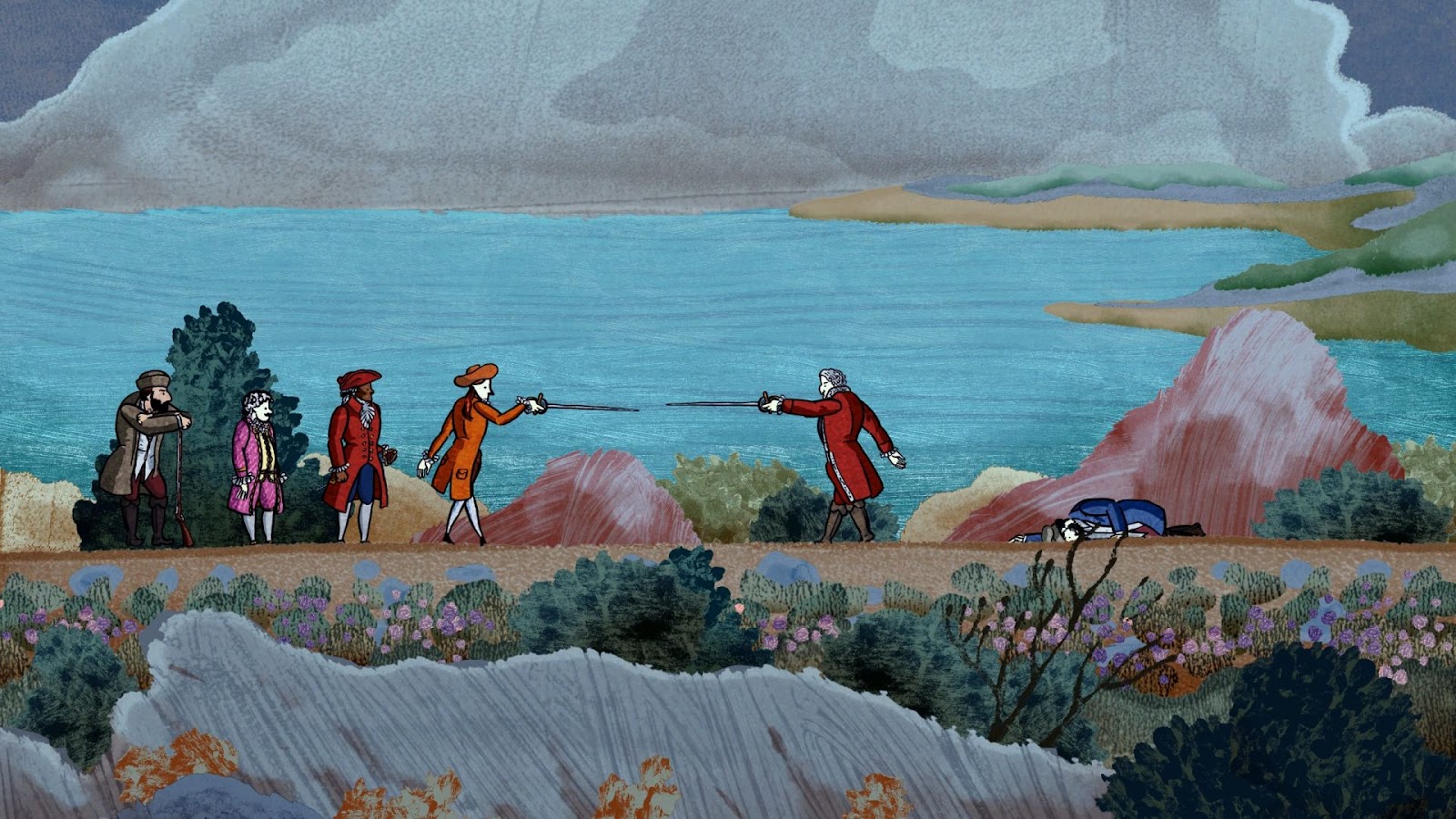
However, to Alliot, the Comte still plays second fiddle to Eugene, the player character of the game. ‘The most important character is, for me, Eugene. That was a very interesting character for me to play with, more than the Comte. Because the Comte is a trickster, a master of cheating. Whereas Eugene is earning the tricks and goes from the beginning to the end of the game where he becomes even better than the Comte, deciding the final outcome of the game.’
Aristocracy now
The way that class and status slips onto individuals as easily as a gaudy, ornate jacket is one of the most interesting parts of Card Shark’s narrative. Throughout the game we meet individuals who inhabit roles as both pauper transients and baronesses, and our nobody of a main character penetrates and conquers high society with nothing more than card tricks.
Card Shark’s story plays out in the dying days of the 18th century French social order, and the collapse of the monarchy, a phenomenon that Eugene and the Comte are more than happy to exploit. ‘This is a time where the structure of the old aristocracy is still present… but it’s crumbling, everything is crumbling. There’s no way for you to approach the king unless you are a cheat, and cheating your way to the king is actually possible, because the order is so weak. For a game about cheating, it’s the perfect setting. This is a bunch of cheats trying to make their way in a very unfair society.’
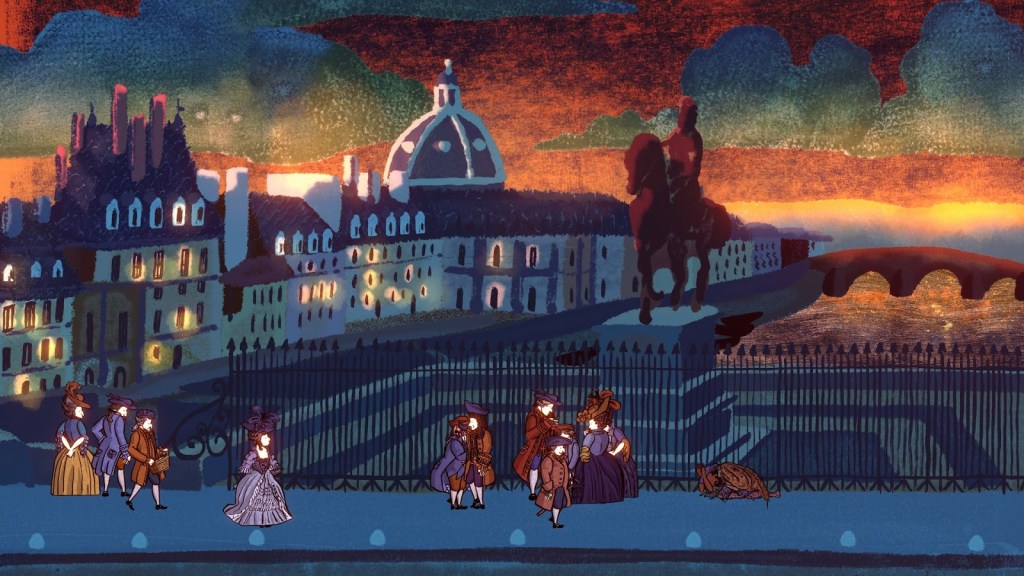
Ultimately, though, no amount of parlour tricks and sleight of hand can break the illusion that Eugene himself is captured by. ‘The whole arc of the game is to show that; first, you believe that you’re part of the world that you’re discovering, that maybe, you might be much more important than you believe … Then, like everything else, it’s illusion; it’s theatre. The illusion is on every side,’ says Alliot.
The morality of engaging and propagating such illusions is not lost on him either. ‘Your actions are not null,’ he states, referencing characters whose lives are irreparably harmed or even ended because of your willingness to cheat in each and every social encounter; a tavern owner dead on the floor of their establishment, or a young man left disgraced and wayward by gambling addiction.
It leaves me feeling like Card Shark is ultimately a game about trust. Trusting your interactions with other people, and what a breach of trust does to relationships, and can do to a country writ large. A layer of abstraction and social contracts is necessary for any meaningful political and personal engagement, but in the world of Card Shark, those things are all but dissolved; palmed into a pocket, or stacked illegitimately in a side room.
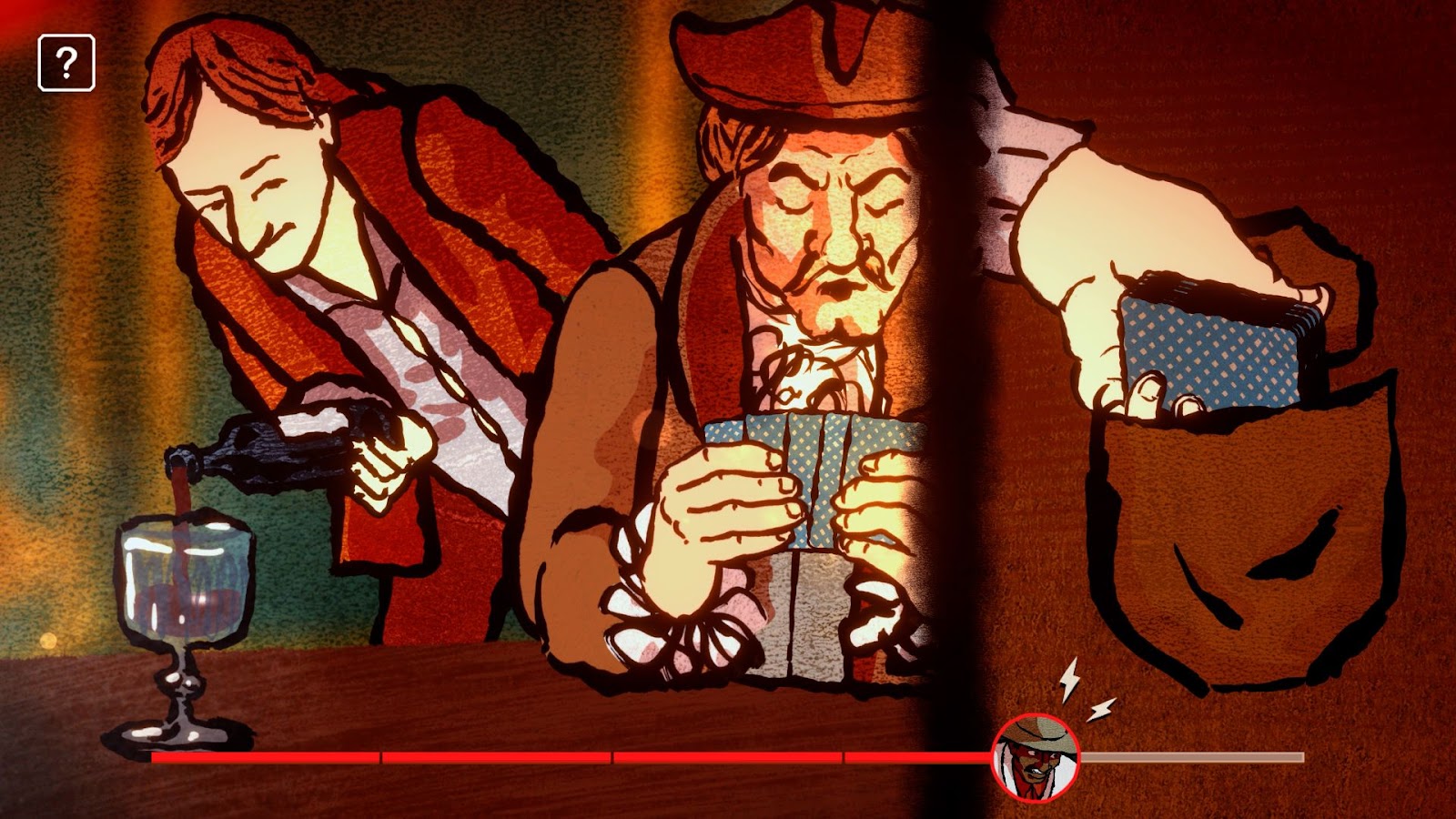
Back in Toulouse, under the chandeliers of the Parliament Café, Jean-Baptiste le Rond d’Alembert and Voltaire indulge happily in these illusions and the games they present. Though considered progressive for the time, they too are comfortable, aloof; shielded from practical threats in a gilded tower of abstracted ideas and thought-experiments. ‘It’s an interesting look at the revolution, because the way the thinkers were conceiving of the “new world” didn’t happen. The Golden Age, and Rousseau trying to bring it back; Voltaire and justice,’ says Alliot.
‘That was all very good and nice, but at the same time, the society was not like that.’
Card Shark is available now on PC and Nintendo Switch.
